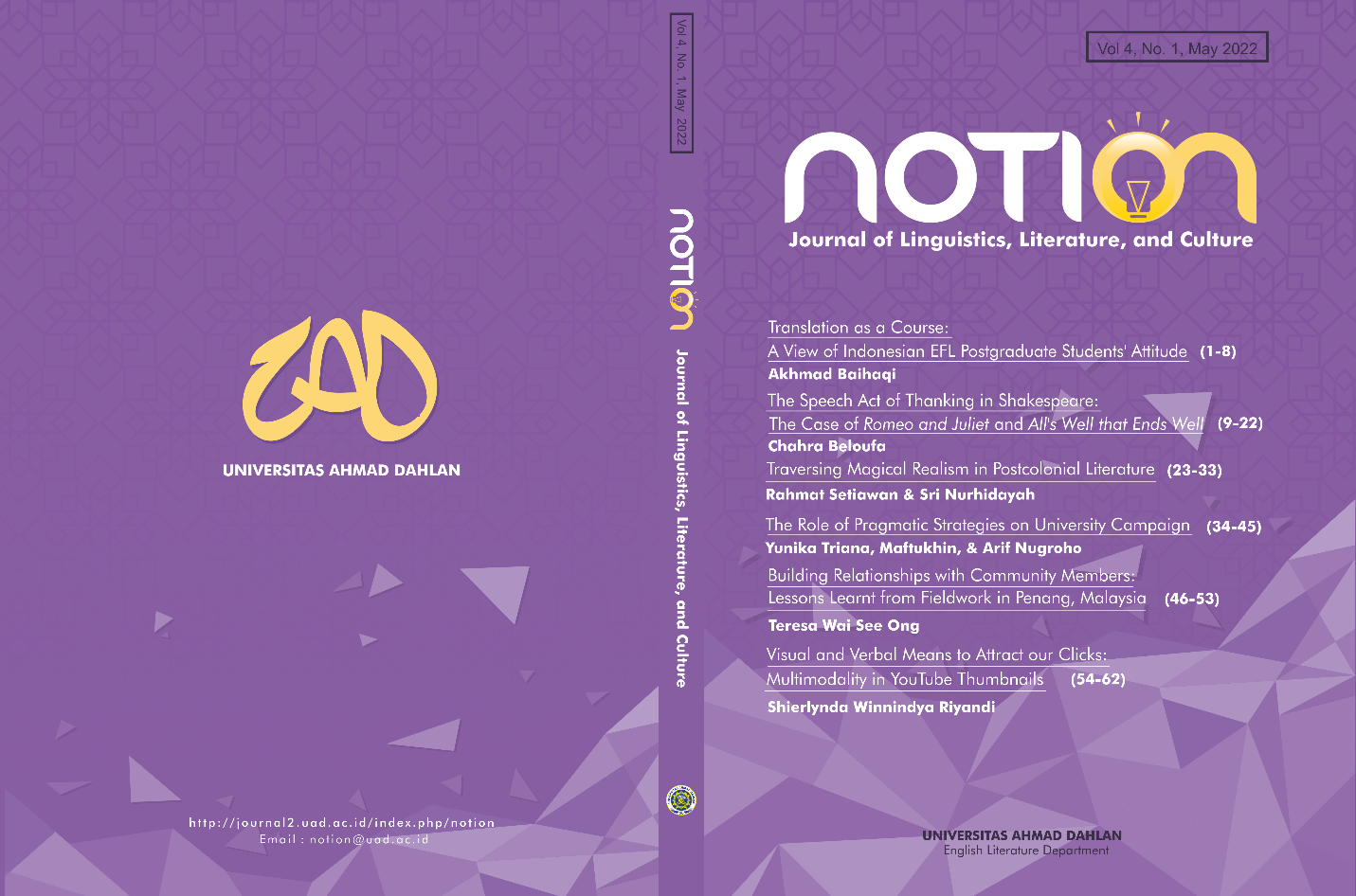Traversing Magical Realism in Postcolonial Literature
DOI:
https://doi.org/10.12928/notion.v4i1.5692Keywords:
Magical, , Real, West, , East, , Literary Works, , Postcolonial StudiesAbstract
This article aims at traversing historical traces, concepts, and characteristics of magical realism and how it is pertinent in literary analysis. The pivot of the conceptual framework of this article in on Faris’ perspective on magical realism. The approach of this study is grounded theory. The data are quotations taken from referential books and journals. The techniques of data collection are documentation and quoting. The technique of analysis is thematic interpretation. This article figures out that magical realism deconstructs the status of magical and the real into a somersaulting realm. Western historical narrative establishes the real through rationality and alienates the magical which is identical to the East, the Other, or the indigenous. This rational narrative is propagandized and turns to be power relation. Therefore, magical realism, through some literary works, deconstructs the rational perspective with logical-magical narrative as one of postcolonial studies.
References
McLeod, J. (2020). Beginning postcolonialism (second edition). http://doi.org/10.7765/9781526153531
Luburić-Cvijanović, A. (2020). Magic, realism and the river between: The cultural weight of postcolonial magic(al) realism. Kultura, 168, p. 69-87. https://doi.org/10.5937/kultura2068069l
Swales, M., Zamora, L. P., & Faris, W. B. (1998). Magical realism: Theory, history, community. The Modern Language Review, Vol. 93 (1), p. 154-155. https://doi.org/10.2307/3733637
Cooper, B. (2012). Magical realism in West African fiction: Seeing with a third eye. London: Routledge. https://doi.org/10.4324/9780203451397
Rajabi, A., Azizi, M., & Akbari, M. (2020). Magical realism: The magic of realism. Rupkatha Journal on Interdisciplinary Studies in Humanities, Vol. 12 (2), p. 1-13. https://doi.org/10.21659/rupkatha.v12n2.18 .
Hart, S. M. & Hart, J. (2021). Magical realism is the language of the emergent Post-Truth world. ORBIS Litterarum, Vol. 76(4), p. 158-168. https://doi.org/10.1111/oli.12297
Shahab, A., Faruk, F., & Rokhman, A. (2020). French literature: From realism to magical realism. Jurnal Poetika, Vol. 8(2), p. 170. https://doi.org/10.22146/poetika.v8i2.58651
Kosasih, A. (2018). Pendekatan grounded teori (grounded theory approach): Sebuah kajian sejarah, teori, prinsip dan strategi metodenya. Prosiding Seminar Hasil Penelitian Dosen UNINDRA, p. 122-132. http://www.proceeding.unindra.ac.id/index.php/dispangenap2018/article/viewFile/194/126
Creswel, J. W. (2013). Research design: Qualitative, quantitative, and mixed methods approaches. https://doi.org/10.3109/08941939.2012.723954
Craver, G. (2014). Not just for beginners - A review of successful qualitative research: a practical guide for beginners. The Qualitative Report, Vol. 19(48), 1-4. https://doi.org/10.46743/2160-3715/2014.1206
Gyenge, Z. (2017). Dreaming of cinema: spectatorship, surrealism, and the age of digital media, by Adam Lowenstein. Alphaville: Journal Film & Screen Media, 12, p. 110-115. https://doi.org/10.33178/alpha.12.08
Hart, P. Zamora, L. P., & Faris, W. B. (1996). Magical realism: Theory, history, community. World Literature Today, Vol. 70(3), p. 770. https://doi.org/10.2307/40042325
Braham, P., Echevarria, R. G., & Pupo-Walker, E. (1998). The Cambridge history of latin American literature. Hispanic Review, vol. 66(1), p. 110-111. https://doi.org/10.2307/474792
Foster, D. W. & Lindstrom, N. (1996). Twentieth-century Spanish American fiction,” Hispanic Review, Vol. 64(4), p. 556-558. https://doi.org/10.2307/474903
Connell, L. (1998). Discarding magic realism: Modernism, anthropology, and critical practice. Ariel: A Review of International English Literature, Vol. 29(2), p. 96-110. https://journalhosting.ucalgary.ca/index.php/ariel/article/view/34011
Davis, C. C. & Watt, I. (1960. The rise of the novel: Studies in Defoe, Richardson, and Fielding. William & Mary Quarterly, Vol. 17(3), p. 425-426. https://doi.org/10.2307/1943466
Ryan, K., Sahay, A., Ings, R., Sweeney, C., Bush, R., Shershow, S. C., MacLachlan, S., Dowd, G. V., Eaglestone, R., Taylor, K., & Royle, N. (1997). Reviews. Textual Practice, Vol 11(2), p. 335-398. https://doi.org/10.1080/09502369708582283
Hemmings, F. W. J. (1973). Review. Realism by Damiant Grant. French Studies, Vol. 27(4), p. 81-90. https://doi.org/10.1093/fs/27.4.465
Chanady, A. B. (2019). Magical Realism and The Fantastic. London: Routledge. https://doi.org/10.4324/9780429319839
Thamarana, S. (2015). Magic realism in English literature and its significant contribution. Internatioinal Journal of English Language Literature, and Translation Studies, Vol. 2(4), p. 263-266. http://ijelr.in/2.4.15/263-266%20SIMHACHALAM%20THAMARANA.pdf
Sperber, D. & Cummins, S. (2007). Rudiments of cognitive rhetoric. Rhetoric Society Quarterly, Vol. 37(4), p. 361-400. https://doi.org/10.1080/02773940701658104
Lainck, A. & Moura, E. R. (2020). Magical realism and the fantastic. In W. Raussert, G. L. Anatol, S. Thies, S. C. Berkin, J. C. Lozano,The Routledge Handbook to the Culture and Media of the Americas. London: Routledge. https://doi.org/10.4324/9781351064705-12 .
Pappin, G. J. (2016). Pierre Manent and the politics of the possible. Perspective on Political Science, vol. 45(4), p. 300-308. https://doi.org/10.1080/10457097.2016.1221693
Cixous, H. (2014). Sorties: Out and out: attacks/ways out/forays. In A. D. Schrift, The Logic of the Gift: Toward an Ethic of Generosity, p. 26. https://doi.org/10.4324/9780203760369-19
Lyotard, J.-F., Bennington, G., & Massumi, B. (1984). The postmodern condition: A report on knowledge. Poetic Today, Vol. 5(4), p. 886. https://doi.org/10.2307/1772278
Faris, W. B. (2004). Ordinary enchantments: Magical realism and the remystification of narrative. World Literature Today, Vol. 79(2), p. 110-111. https://doi.org/10.2307/40158753
Downloads
Published
Issue
Section
License
Copyright (c) 2022 Sri Nurhidayah, Rahmat Setiawan

This work is licensed under a Creative Commons Attribution 4.0 International License.
Authors who publish their articles in NOTION: journal of Linguistics, Literature, and Culture agree to the following terms:
- Authors retain the copyright and grant the journal right of first publication with the work simultaneously licensed under a Creative Commons Attribution 4.0 International License that allows others to share the work with an acknowledgement of the work's authorship and initial publication in this journal.
- Authors are able to enter into separate, additional contractual arrangements for the non-exclusive distribution of the journal's published version of the work (e.g., post it to an institutional repository or publish it in a book), with an acknowledgement of its initial publication in this journal.
- Authors are permitted and encouraged to post their work online (e.g., in institutional repositories or on their website) prior to and during the submission process, as it can lead to productive exchanges, as well as earlier and greater citation of published work.





